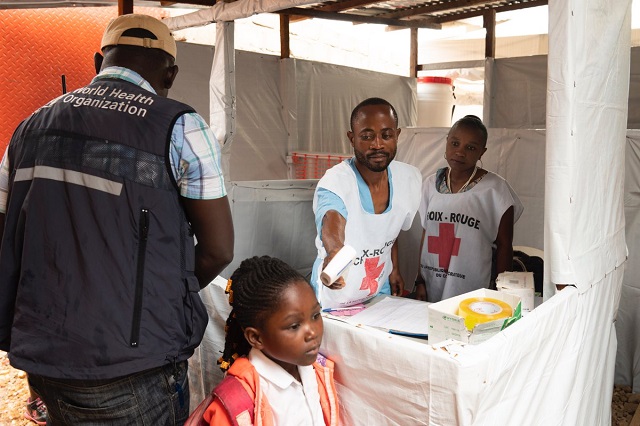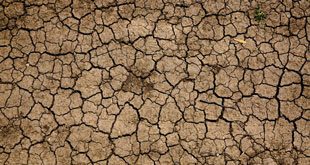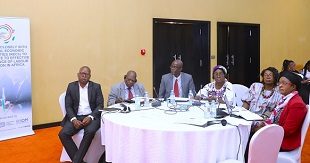
Goma, DR Congo | AFP | An Ebola epidemic in eastern DR Congo marked its first anniversary on Thursday with two more cases in the densely-populated frontier city of Goma and accusations by Kinshasa that Rwanda had rushed to shutter its border in response to the crisis.
The two new cases of infection are the wife and baby of a man who had died of Ebola on Wednesday, health workers said.
More than 1,800 lives have been lost in eastern Democratic Republic of Congo since Ebola broke out on August 1 2018.
Fears that the disease could spread to neighbouring countries have mounted since mid-July, when the first of two fatalities occurred in Goma, a transport hub lying adjacent to the Rwandan city of Gisenyi.
DRC President Felix Tshisekedi’s office on Thursday said Rwanda had made a “unilateral decision” to close its border — a move, it said, that was reversed eight hours later.
Goma, which has a population of more than two million, and Gisenyi, a city of more than 85,000, have close ties that depend on open borders.
Many people have jobs on the other side of the border while others have homes or put their children in schools in the neighbouring city.
– Measures to reinforce screening –
An AFP reporter in Goma in Gisenyi said at mid-morning that the frontier had been closed. In Rwanda. A Rwandan government official, speaking on condition of anonymity, said “it is closed”, without giving further details.
But the Rwandan health ministry later said the border had never been closed.
There had only been a “traffic slowdown… as measures were put in place to reinforce screening procedures and public safety at entry points,” it said in a statement.
Health Minister Diane Gashumba told journalists, “I talked with my counterpart the DRC minister of health and clarified that the border is open and should remain open.”
Rwandans from Gisenyi and Congolese on the other side started crossing the border again late Thursday with shouts in joy, an AFP reporter at the scene said.
“I have been waiting since 7:00 am (5:00 GMT),” Antoinette Zeyimana, a Rwandan saleswoman, told AFP.
Congolese authorities had assured Rwandan frontier officials that hand-washing and temperature-sensing measures would be strengthened at the border to identify suspicious cases, according to one DRC immigration source.
– Widening scare –
Goma is the capital of North Kivu province, which has borne the brunt of the year-old epidemic, followed by neighbouring Ituri province.
Fifteen people have also been placed in quarantine in South Kivu province, which has so far escaped the epidemic.
The 15, including a mother and her six children who had come from Goma, were isolated in a hospital at Birava, the hospital’s chief doctor, Ciza Nuru, said.
South Kivu Governor Theo Ngwabidje Kasi told the press Thursday that tests on the 15 were negative.
The first death in Goma, reported on July 16, was of an evangelical preacher who had travelled from Goma to Butembo, one of the towns hardest hit by the outbreak.
The second Goma fatality, who died on Wednesday, was a gold miner who had been working in Mungwalu in Ituri province and had returned to his wife and 10 children at their home in the poor district of Kiziba.
He showed symptoms of Ebola on July 22. His one-year-old daughter then fell ill and tested positive for the disease on Wednesday, investigators said.
Within hours of the announcement of this case, Rwanda closed the border, Congolese officials said.
WHO coordinator Boubacar Diallo said the fourth case “is the wife of the man who died yesterday morning.”
“We are carrying out investigations,” he told AFP.
– Laborious fight –
Health experts are especially concerned when contagious disease breaks out in a city.
In an urban setting, density of population, anonymity and high mobility make it far harder to isolate patients and trace contacts compared to the countryside.
The day after the preacher’s death was announced, the WHO declared the epidemic a “public health emergency of international concern” — a move that prompted a surge in funding pledges.
The Ebola virus causes fever, vomiting and severe diarrhoea, often followed by kidney and liver failure, internal and external bleeding.
The disease is spread by contact with infected body fluids and is fought with time-honoured but laborious techniques of tracing contacts and quarantining them.
The latest epidemic is the second deadliest on record after more than 11,000 people were killed in Guinea, Sierra Leone and Liberia between 2014-2016.
 The Independent Uganda: You get the Truth we Pay the Price
The Independent Uganda: You get the Truth we Pay the Price


